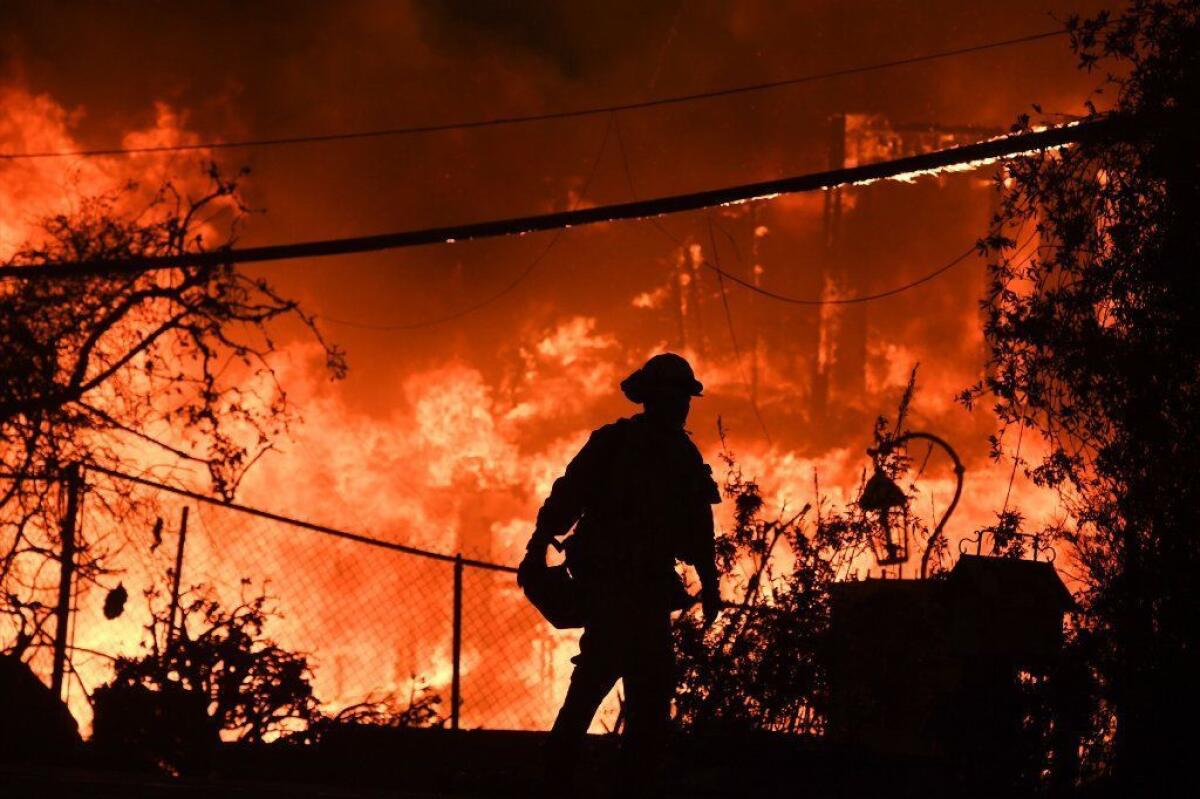L.A. County sues Edison over devastating Woolsey fire, citing $100 million in losses

- Share via
Los Angeles County on Thursday joined a growing list of entities suing Southern California Edison, seeking to hold the utility accountable amid hints that its damaged electrical equipment may have sparked the devastating Woolsey fire.
The lawsuit, filed in Los Angeles County Superior Court, seeks millions of dollars in damages related to the fire.
The official cause of the fire — the most devastating in county history, consuming more than 96,000 acres, destroying 1,600 structures and killing three people last November — hasn’t been determined yet by the California Department of Forestry and Fire Protection.
But county officials pointed to the utility’s regulatory filings, which noted an equipment malfunction near where the fire began.
“This legal action is an important and essential step toward accountability and recovery,” said Supervisor Sheila Kuehl, whose district includes much of the fire-damaged areas. “Although I know it won’t bring people’s homes or businesses back, and won’t heal the trauma or grief my constituents are experiencing, or restore our charred hillsides, it’s very important to require entities to be held responsible.”
By the county’s estimates, it spent more than $100 million on the massive emergency response and fire suppression efforts, in addition to repairs to infrastructure and natural resources. The tally also includes lost tax revenue and expenses from the dozen county departments that responded to the blaze.
The county’s flood control and consolidated fire protection districts are listed as plaintiffs as well.
Edison officials declined to comment specifically about the county’s claims on Thursday, as it has with other legal cases stemming from the fires.
In a written statement, it said: “The safety of the public, our customers, communities and employees and contractors is always our first priority. Our thoughts remain with all those across the state who have been affected by these devastating wildfires. We continue to work to help our customers and communities recover and rebuild from these catastrophic events.”
The company has said that it’s “fully cooperating in their investigation” by Cal Fire, which could take months to complete.
The suit alleges negligence by Edison and names the utility’s parent company, Edison International. But the suit also cites inverse condemnation — a legal doctrine that has held utilities liable whenever their equipment ignites fires, regardless of negligence, in addition to other claims.
Hundreds of homeowners and business have also sued the utility over the Woolsey fire.
According to an annual filing with the U.S. Securities and Exchange Commission in February, Edison said it believes that its equipment “could be found to have been associated with the ignition of the fire.”
To the California Public Utilities Commission, the utility reported an outage on its electric system near the ignition point. To the SEC, the utility said that a piece of its equipment was found in proximity to an electrical wire that was “energized” prior to the outage, suggesting contact.
The fire began the afternoon of Nov. 8 in Ventura County. Fueled by wind gusts topping 70 mph, it burned rapidly and jumped the 101 Freeway the following morning, beginning its devastating progression to the coast in Malibu.
A rash of wildfires in California have put major financial pressure on the state’s largest utilities, including Pacific Gas & Electric, which filed for Chapter 11 bankruptcy citing the liability from the fires for its insolvency.
While Edison doesn’t face the same financial threat as PG&E, which could be found liable for the Camp fire in Butte County last fall, it has asked regulators to approve higher rates. The money would help mitigate the threat from the growing risk of destructive fires — and pay for its mounting legal liabilities. Under one request, the average household could see an annual bill increase of $170.
More to Read
Sign up for Essential California
The most important California stories and recommendations in your inbox every morning.
You may occasionally receive promotional content from the Los Angeles Times.














